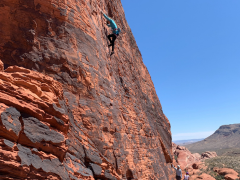Social Media Helps Statisticians Track Foodborne Illness and Improve Disaster Response
August 20, 2015
Social media has power beyond serving as an outlet for self-expression and a place to share pretty pictures of donuts with friends. Statisticians are tapping into the data produced by social media posts and making humanitarian strides: from tracing foodborne illnesses to improving disaster response.
Tracing Food Illness through Yelp & Social Media
Remember the time you were so excited to treat yourself to order-in sushi? Only hours later your sweaty fingers were tapping out a scathing Yelp review from the bathroom amid bouts nausea caused by food poisoning. We’ve all been there. It turns out all those upset stomachs, angry reviews and social media posts have been put to good use, thanks to biostatistician Elaine Nsoesie.
Traditional tracking systems only identify very few foodborne illness cases, in part because many go unreported. Nsoesie conducted a study to determine whether those single-star Yelp reviews and angry Tweets could help enhance existing surveillance systems to report outbreaks of foodborne illness. The results of the test were similar to outbreak reports issued by the U.S. Centers for Disease Control and Prevention.
“Online reviews of foodservice businesses offer a unique resource for disease surveillance. Similar to notification or complaint systems, reports of foodborne illness on review sites could serve as early indicators of foodborne disease outbreaks and spur investigation by local health authorities. Information gleaned from such novel data streams could aid traditional surveillance systems in near real-time monitoring of foodborne related illnesses,” said Nsoesie.
Improving Disaster Response with Social Media Analysis
Another area where statisticians leverage social media is in improving disaster response. Natural disasters are traumatic events, and time is of the essence for emergency response providers.
In 2013 after Typhoon Haiyan hit the Philippines, Michiko Wolcott and a team of statisticians from Statistics without Borders (an outreach group of the American Statistical Association) worked with Humanity Road, a charity with disaster prepared volunteers. Together they created a guide for best practices when analyzing social media in emergency response.
The study’s goal was to look at tweets to determine how social media can and should be used during natural disasters. “Social media can play a critical role in the dissemination of the information, as well as collection of relevant data during natural disasters,” explained Wolcott.
While social media plays a key role in the very fabric of our society, some filtering must be done by statisticians for social media to be useful in times of crisis. Considerations such as relevance, geolocation, language, and whether mobile devices and computers are able to transmit during a disaster all need to be taken into account by emergency responders using these data.
Read more about these two influential studies in this press release, and find out more about how statisticians are making positive impacts on the world here.
Related Posts

Hindsight Is 2023 for Former Statistics and Data Science Students
It’s back-to-school season! Gear up for the upcoming semester and consider diving into the captivating world of statistics and data science. Looking for diverse job opportunities that span across every industry? Look no further! With a variety of graduate programs and jobs, now is a great time for students to become data scientists and statisticians….

Elizabeth J. Kelly: “Statistics is for Adrenaline Junkies”
Elizabeth J. Kelly has always loved math, and as a professional statistician at Los Alamos National Laboratory (LANL) and a recreational rock climber, Elizabeth is an avid thrill-seeker who enjoys a challenge. “Math reminds me of climbing, including the need to focus, problem solve and persevere. I guess I ended up in statistics because I…



